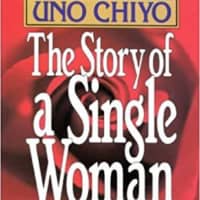An independent spirit in an age when society could be unsparing in its scorn for single-minded women, Chiyo Uno’s (1897-1998) semi-autobiographical writings and personal affairs suggest a natural flair for living life on her own terms.
Much like the main character in her novel, “The Story of a Single Woman,” Uno escaped her family and provincialism by moving to Tokyo where she pursued the life of a writer. She blithely entered into a number of indiscreet love affairs during a time when adultery was a criminal offense, but rather than allowing her scandals to dominate the public’s attention, Uno drew focus to her characters and their dissolute lives, gaining respect in the process for her mastery of style and narrative.
In “The Story of a Single Woman,” the protagonist is an elderly woman named Kazue who looks back with a frank, unsentimental gaze on her serial dalliances and indiscretions. As she revisits her past, she seeks meaning, or at least motive, for her commitment to the relationships so vividly recounted in her retrospective. The female characters in this short novel tend to be self-assured and driven by passion, instinct and emotion. The male characters are invariably physically commanding, morally reprehensible and ultimately dispensable.
The extent to which Uno’s characters take up with partners, then dispose of them, implies a degree of callousness, or at best, an impulse against outmoded assumptions regarding conduct between the sexes. One must not forget, however, that despite the autobiographical content of the novel, the work remains firmly within the sphere of fiction.

















With your current subscription plan you can comment on stories. However, before writing your first comment, please create a display name in the Profile section of your subscriber account page.